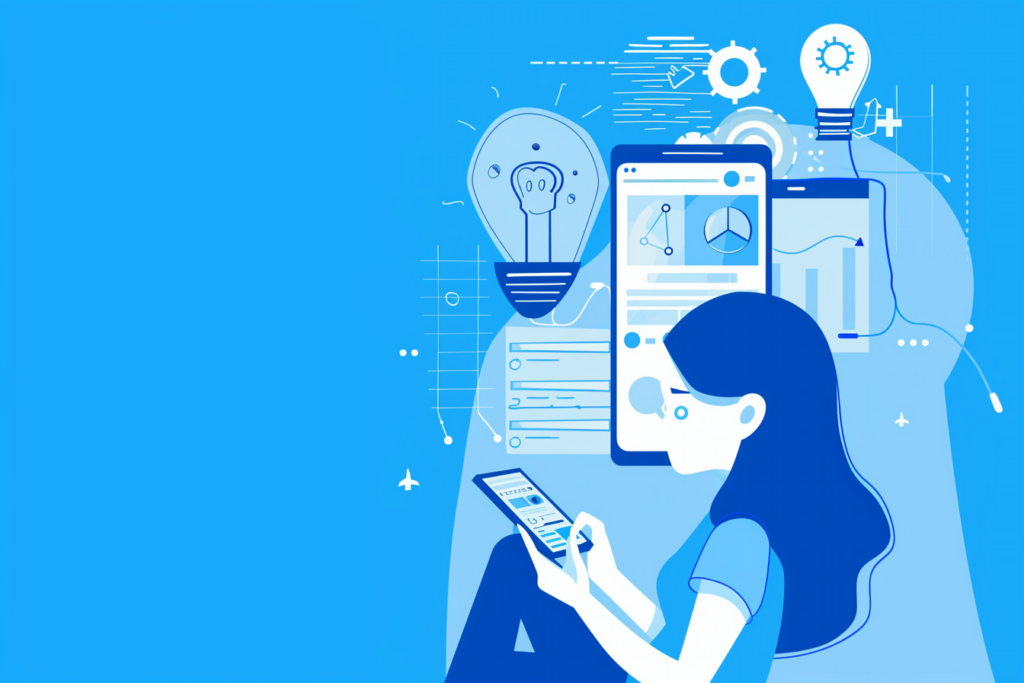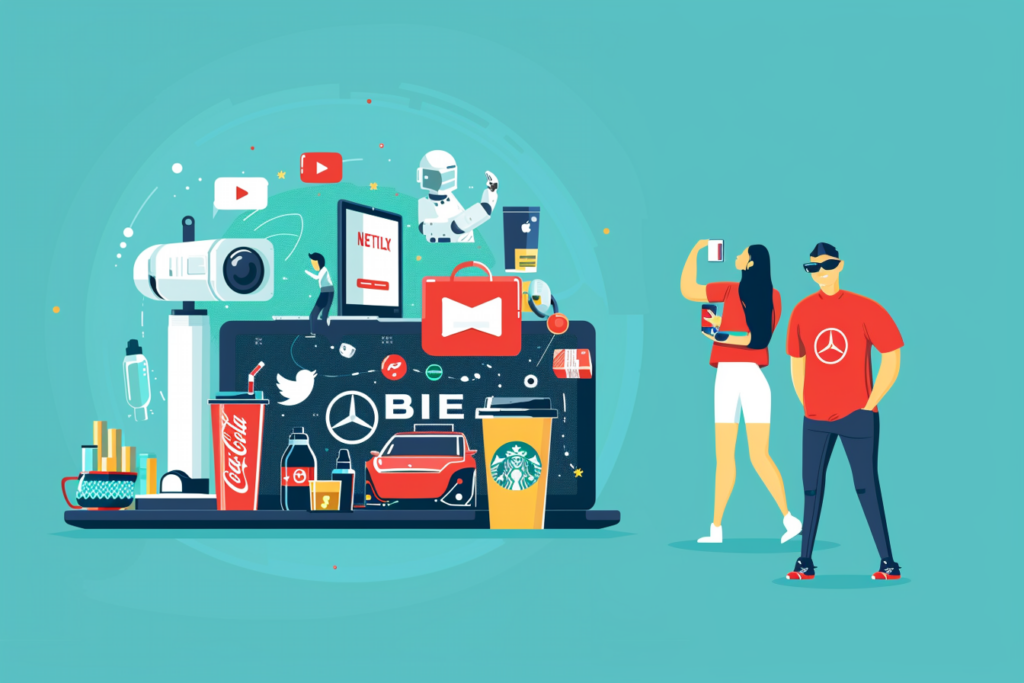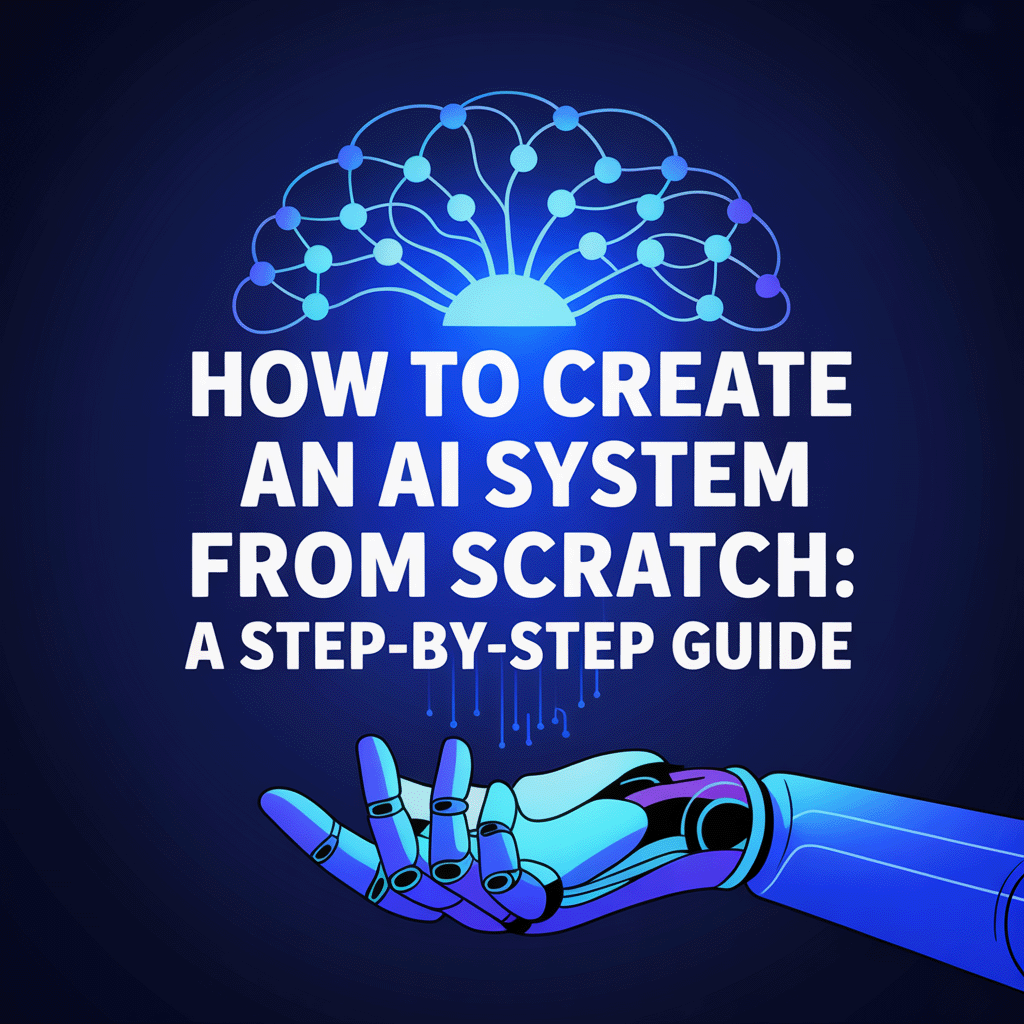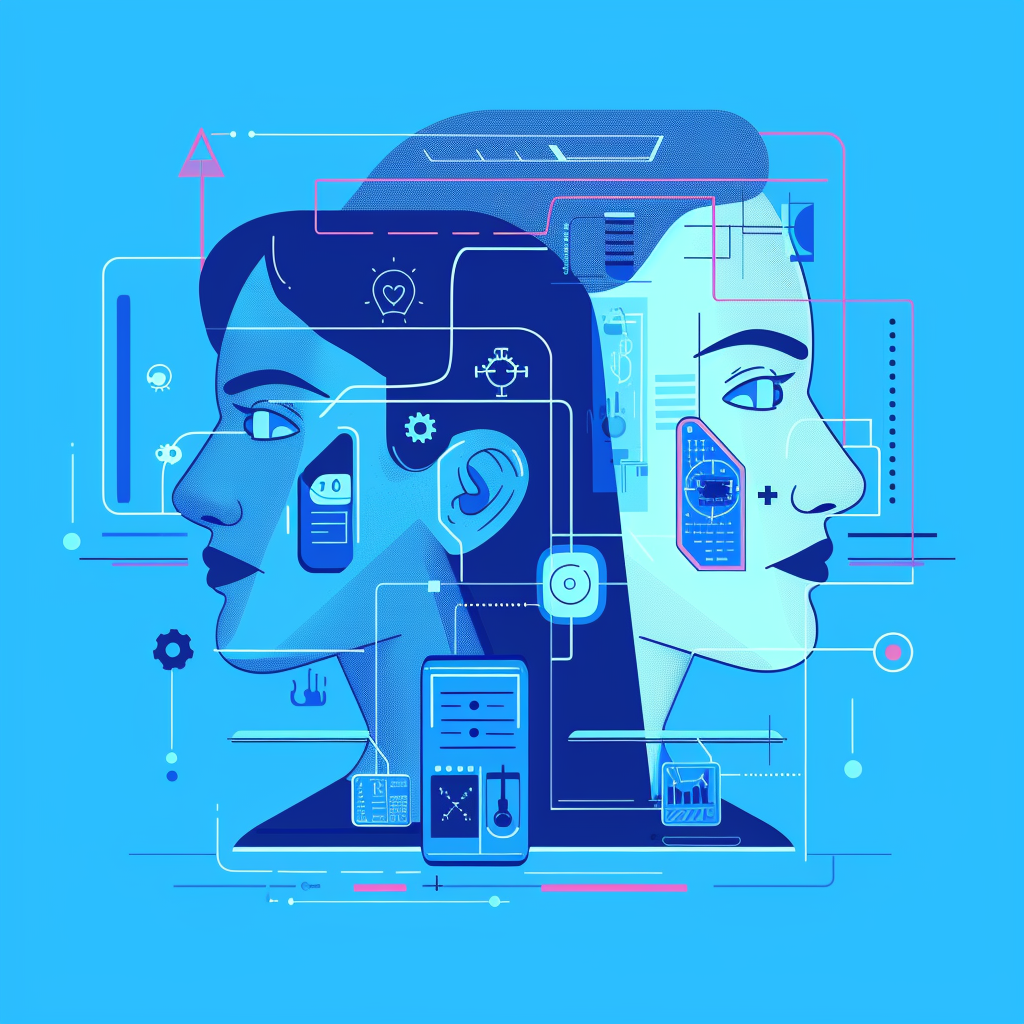A small boutique in a busy city is having difficulty competing with larger retailers. The owner dedicates numerous hours to inventory management, customer preference analysis, and developing unique marketing strategies. Despite feeling overwhelmed, they are determined to find a way to succeed in this competitive market. But is there one?
Yes, absolutely! Imagine a marketing campaign that captures your target audience’s attention, adapts in real-time, and boosts engagement and conversions without manual intervention. This is the reality of AI-driven marketing.
By implementing an AI-powered recommendation engine, Amazon’s sales skyrocketed by 35% in a year. This technology analyzed customer behavior and preferences, delivering personalized product suggestions that felt intuitive and spot-on, transforming casual browsers into loyal customers.
In this article, we will explore impressive examples of AI in marketing and how small and mid-sized businesses can use this technology to enhance customer experience, optimize marketing efforts, and gain a competitive edge. Discover how AI can elevate your marketing strategies.
AI in Marketing: What is It?
Imagine having a marketing assistant who works 24/7, never takes breaks, and can analyze millions of data points in seconds to provide insights that would take a human team weeks to find. This is the power of artificial intelligence in marketing. It can process large amounts of data faster and more accurately than humans, revealing hidden insights. This capability is changing how businesses handle tasks like customer service and ad targeting. Find out more fascinating facts about this technology in our blog.
So, what exactly is AI in marketing? Simply put, it means using smart algorithms and machine learning to automate tasks, personalize customer interactions, and make data-driven decisions. AI acts as a predictive tool for trends and real-time actions, revolutionizing marketing for businesses and enabling companies to enhance their efforts and get superior results with less work.
The benefits of AI in marketing are numerous, from automating tasks to personalizing customer interactions and making data-driven decisions. In another one of our articles, you can learn more about the evolution of artificial intelligence in business through the years.
Statistics and Facts:
- Market Growth: A report by Inkwood Research says that the global AI in marketing niche is expected to grow from $11.73 billion in 2020 to $82.70 billion by 2028, a CAGR of 26.58%.
- Increased Adoption: A survey by IBM revealed that 23% of marketing professionals use AI in their work.
- Efficiency Boost: McKinsey reports that businesses using AI for marketing and sales have seen a 10-20% improvement in marketing ROI.
- Personalization Impact: A study by Epsilon found that 80% of consumers are more likely to make a purchase when brands offer personalized experiences.
- Content Generation: Gartner predicts that by 2025, AI will write 30% of all business content, including reports, press releases, and marketing copy.
These statistics highlight the transformative impact of AI in marketing for small and mid-sized business owners. Embracing AI can improve operational efficiency, enhance customer engagement, and boost revenue. Find out even more ideas on harnessing the power of AI in business. The opportunities are limitless whether you are new to AI or seeking to enhance existing strategies.
In the following sections, we will explore specific examples of AI in marketing and provide guidance on implementing these technologies in your promotion strategies. 
How to Use AI in Marketing
AI offers a multitude of applications in marketing, each designed to make your campaigns more efficient, personalized, and effective. Let’s explore some of the most impactful ways to leverage AI in your marketing strategy, backed by statistics and real-world examples.
Predictive Analytics
Predictive analytics uses AI to analyze historical data and predict future outcomes. Integrating predictive analytics into your marketing tech stack allows businesses to anticipate customer behavior, optimize marketing campaigns, and improve decision-making. Plus, statistics show that firms that use predictive analytics are 2.9 times times more likely to report revenue growth rates higher than the industry average.
Customer Segmentation
AI can analyze customer data to segment your audience more precisely, enabling highly targeted marketing campaigns. Companies suggest products to customers based on what they’ve bought before, helping them sell more products. Targeted marketing campaigns driven by AI can increase conversion rates by up to 15% for the same cost per action.
Chatbots and Virtual Assistants
AI-powered chatbots can handle customer inquiries, provide support, and even assist in purchasing in real-time. For instance, chatbots on Facebook Messenger can offer product recommendations, answer questions, and book appointments. No wonder that by 2027, chatbots are expected to handle 25% of customer service interactions.
Personalized Content Creation
AI can generate personalized content for your marketing campaigns, from emails to social media posts. This ensures that each piece resonates with your audience. Indeed, personalized email campaigns can generate a 760% increase in revenue from segmented campaigns. An interesting case is The Washington Post. The company uses an AI tool called Heliograf to write simple news reports and updates, thus freeing up journalists for more complex stories.
Ad Targeting and Optimization
AI can analyze user data to create highly targeted ads and optimize ad spend, ensuring your marketing budget is used effectively. Using AI, firms can study social media data and create targeted ad campaigns that resonate with different audience segments. As a result, companies see a 20% increase in conversion rates through ad targeting and optimization.
Sentiment Analysis
AI can analyze customer feedback, social media posts, and reviews to gauge public sentiment about your brand, helping you respond proactively. Nike uses sentiment analysis to monitor customer feedback on social media and adjust its marketing strategies accordingly, which is crucial for its brand reputation management.
Automated Campaigns
With AI, companies can automate entire marketing campaigns, allowing for more efficient and consistent outreach. HubSpot uses AI to automate email campaigns, segment audiences, and personalize content to maximize engagement through its target accounts feature. Thus, AI can significantly benefit firms, as automated marketing campaigns can see a 14.5% increase in sales productivity and a 12.2% reduction in marketing overhead.
How to Get Started with AI in Marketing
- Identify Your Needs: Determine which areas of your marketing strategy, such as customer segmentation, content creation, or ad targeting, could most benefit from AI.
- Choose the Right Tools: Research and select AI tools that fit your needs and budget. Consider platforms like HubSpot, Venturz, Salesforce, or Adobe’s AI-powered marketing solutions.
- Start Small: Implement AI in one aspect of your marketing strategy to test its effectiveness before scaling up.
- Monitor and Adjust: Continuously monitor the performance of your AI-driven campaigns and make adjustments as needed to optimize results.
- Invest in Training: Ensure your team is trained to use AI tools effectively and updated on the latest AI trends and technologies.
AI is not just a technological advancement; it’s a strategic advantage that can transform your marketing efforts. Integrating AI into your marketing strategy can create more personalized, efficient, and impactful campaigns that drive business growth. In the next section, let’s take a closer look at how big companies use AI in their marketing.
Notable AI in Marketing Examples
AI is not just a theoretical concept—it’s already being used by businesses worldwide with remarkable results. Here are some compelling examples of how AI is transforming marketing.
Spotify’s Personalized Playlists
Spotify uses AI in marketing to make personalized playlists for its users based on what they listen to and like. By analyzing users’ listening habits and preferences, Spotify’s AI generates custom playlists like Discover Weekly and Release Radar. Having music that’s just right for users makes the platform even better and keeps them coming back for more. Consequently, Spotify’s AI-driven recommendations contribute to its high user retention rate and have made it a leader in the music streaming industry.
Amazon’s Product Recommendations
Amazon employs AI algorithms to suggest products based on customers’ browsing and purchase history. This personalized shopping experience not only boosts customer satisfaction but also drives more purchases. Amazon’s recommendation engine, powered by AI, contributes a staggering 35% of its total sales, a testament to AI’s significant role in revenue generation.
Sephora’s Virtual Artist
Sephora’s Virtual Artist, an AI-powered feature in their app, allows customers to try on makeup virtually. Using facial recognition technology, it offers personalized product recommendations and makeup tutorials. This customer-centric approach has led to a substantial increase in online sales and a decrease in return rates, as customers can now ‘try before they buy.’
Netflix’s Content Recommendations
Netflix uses AI to recommend movies and TV shows based on users’ viewing history and preferences. For instance, if a user frequently watches movies featuring a particular actor, Netflix might recommend another film with that actor. However, instead of generic artwork, the recommendation will feature artwork prominently showcasing that actor to catch the viewer’s attention. These personalized recommendations save Netflix $1 billion annually in customer retention costs.
Coca-Cola’s Social Media Monitoring
Coca-Cola utilizes AI to monitor social media for brand mentions and sentiment analysis. With AI, they respond quickly to customer feedback and trends and make sure their marketing strategies are always relevant and effective. By staying attuned to customer sentiments, Coca-Cola launches strong campaigns and boosts brand loyalty and engagement.
Starbucks’ Predictive Analytics
Starbucks’ AI-driven predictive analytics is a game-changer in their customer engagement strategy. By analyzing customer purchase data, they send personalized offers to customers through their app, increasing engagement and sales. For example, if a customer frequently buys a specific type of coffee, the app might offer a discount on that coffee or suggest complementary products. In this smart way, Starbucks engages customers, fosters loyalty, and drives sales.
Nike’s Hyper-Personalized Ads
By analyzing user data from their apps and online behavior, Nike delivers targeted ads that drive higher conversion rates. For instance, if a user often browses running shoes, Nike’s AI will show ads featuring the latest running shoe models. Consequently, these AI-powered ad campaigns have resulted in a 30% increase in online sales.
Heinz: AI Image Generator
Heinz creates innovative marketing campaigns with an AI image generator. Using this tool, Heinz crafts unique and engaging visuals for its advertisements and tailors them to the preferences and behaviors of different customer segments. Maintaining a fresh and appealing brand presence helps Heinz capture and retain customer interest.
ClickUp: NLP AI to Boost Blog Traffic
ClickUp uses Natural Language Processing (NLP) AI to optimize its blog content for search engines and user engagement. By analyzing trending topics and relevant keywords, ClickUp’s AI suggests improvements to blog posts, such as better headlines, keyword placement, and content structure. This strategy has led to an impressive 85% increase in blog traffic, demonstrating the power of AI in content marketing.
BuzzFeed: Personalizing Quiz Content With AI
BuzzFeed employs AI to personalize its popular quizzes. By analyzing user behavior and preferences, BuzzFeed’s AI tailors quiz content to individual users and ensures each quiz feels relevant and interesting. This personalization has contributed to BuzzFeed’s sustained popularity and high levels of user interaction.
Alibaba: FashionAI Store
Alibaba opened a FashionAI store that leverages AI to provide a seamless and personalized shopping experience. The store uses smart mirrors and AI algorithms to recommend outfits based on a shopper’s preferences and previous purchases. This not only enhances the shopping experience but also increases sales by suggesting items that customers are more likely to buy.
PepsiCo: Regaining Market Share
With AI, PepsiCo analyzes market trends and consumer preferences to regain market share for its iconic brand. AI insights help PepsiCo adjust its marketing strategies, product offerings, and promotional campaigns to better meet customers‘ needs.
Grammarly: Customer-Facing Communications
Grammarly’s AI technology assists Zoom in scaling its customer-facing communications. By providing real-time grammar and style suggestions, Grammarly ensures Zoom’s messages are clear, professional, and effective. This partnership helps Zoom maintain high communication standards and enhance customer satisfaction and engagement.
Mercedes-Benz: Monitoring Social Media Mentions
Mercedes-Benz uses AI to monitor over 200,000 social media mentions. This is how the company stays on top of customer feedback and brand perception. With AI, Mercedes-Benz quickly responds to customer concerns, capitalizes on positive feedback, and ensures that the brand remains responsive and attuned to its audience.
Why These Examples Matter
These examples demonstrate that AI is not just for tech giants; it’s a powerful tool that can benefit businesses of all sizes. By incorporating AI into your marketing strategy, you can achieve:
- Enhanced Customer Experience: Personalize interactions to make every customer feel valued.
- Increased Efficiency: Automate tasks and focus on strategic growth.
- Higher Engagement and Sales: Deliver targeted campaigns that resonate with your audience.
AI is revolutionizing marketing by making it more innovative, more efficient, and highly personalized. These success stories prove that the future of marketing is here, and AI powers it.
Key Benefits of AI in Marketing
- Skyrocketing Adoption: AI is becoming a staple in the marketing toolkit. Salesforce reports that 84% of marketing organizations are already using AI in some form. The number of companies adopting AI for marketing is gradually increasing every year.
- Personalized Customer Experiences: Imagine every customer feeling like your marketing messages were crafted just for them. A study by Accenture shows that 91% of consumers are more likely to shop with brands offering personalized offers and recommendations, thanks to AI-driven analytics.
- Boosting Efficiency: AI takes over repetitive tasks, thus freeing up marketers to focus on creative and strategic initiatives. McKinsey reports that AI can enhance marketing productivity by up to 45%. Think about the time saved on tasks like sorting customer data or scheduling social media posts.
- Informed Decision-Making: AI analyzes large datasets, allowing you to make decisions based on solid data rather than gut feelings. Gartner predicts that by 2025, AI will heavily influence 75% of marketing operations, providing insights that drive smarter strategies.
- Significant Cost Savings: Optimizing ad spend and reducing manual efforts translates to substantial savings. It is estimated that AI could cut their overall costs by up to 60%.
- Real-Time Personalization: AI allows for the personalization of content and offers in real-time, leading to higher engagement rates. Just look at Netflix, which uses AI to recommend shows based on your viewing habits, keeping you hooked and coming back for more.
- Staying Ahead of the Curve: Businesses that leverage AI are not just keeping up with the competition; they’re setting the pace. Adobe’s survey found that top-performing companies are twice as likely to use AI for marketing compared to their peers.
Incorporating AI into your marketing strategy isn’t just a trend—it’s a necessity. Whether you’re aiming to create memorable customer experiences, streamline your processes, or save on costs, AI offers the capabilities to take your marketing to the next level.
The Future of AI in Marketing
The future of AI in marketing promises unprecedented advancements in personalization, automation, and customer insights. As AI technology continues to evolve, it will enable hyper-personalized marketing strategies that adapt in real-time to individual customer preferences. This level of personalization will not only enhance customer satisfaction but also drive higher engagement and sales.
“Digital personalizations [are] no longer merely an option; they’re a necessity,” says Jim Cramer, emphasizing the critical role AI plays in shaping future marketing strategies. AI-driven personalized campaigns are expected to significantly boost customer satisfaction and loyalty.
Industry leaders are also forecasting a massive shift towards automation and efficiency. Automation, driven by AI, will handle a great deal of routine marketing tasks. This will free up marketers to focus on more strategic initiatives, thereby reducing costs and increasing productivity. It is also believed that AI will lead to more accurate data-driven decisions, fundamentally changing the marketing landscape.
As AI continues to refine predictive analytics and enhance customer support through sophisticated chatbots, businesses that leverage these technologies will gain a substantial competitive edge. The message is clear: the future of marketing is deeply intertwined with AI, and those who embrace it will be at the forefront of the industry. If you’re eager to learn more about AI trends and predictions, read our blog.
Takeaways
As we’ve seen, AI is changing marketing in a big way. It can make things more personal, work faster, and interest customers more. From predictive analytics to customer segmentation, AI enables businesses to connect with their audiences more meaningfully. The success stories of companies like Spotify, Amazon, and Nike show how AI can help businesses grow and keep customers happy.
If you’re ready to elevate your marketing efforts and leverage the power of AI, we are here to help. Whether you need to build AI solutions from scratch or integrate advanced AI tools into your existing strategy, our team of AI software development experts can guide you every step of the way. Contact us today to get started on your AI journey.





